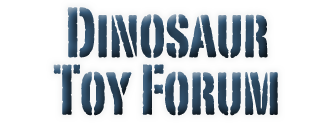- Welcome to Dinosaur Toy Forum.
News:
Dinosaur Toy Forum Diorama Contest 2025 sponsored by Happy Hen Toys – Now Open!
You can support the Dinosaur Toy Forum by making dino-purchases through these links to Ebay and Amazon. Disclaimer: these and other links to Ebay.com and Amazon.com on the Dinosaur Toy Forum are often affiliate links, so when you make purchases through them we may make a commission.
T Rex pulling the heads of Triceratops to eat the neck muscles
Started by andrewsaurus rex, November 24, 2022, 12:33:32 PM
Previous topic - Next topic
User actions




